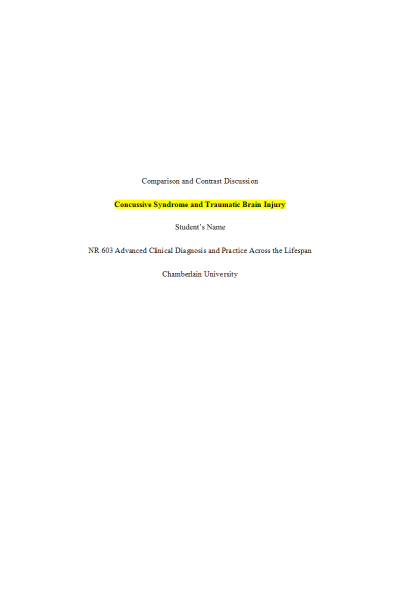NR 603 Week 1 Compare and Contrast Discussion; Post Concussive Syndrome and Traumatic Brain Injury
-
$15.00
| Institution | NR 603 Advanced Clinical Diagnosis and Practice Across the Lifespan |
| Contributor | Sharonda |
Preview of Starting Page
My assigned topics for this week are post concussive syndrome and traumatic brain injury.
Presentation
Post-concussion syndrome (PCS) is a complex disorder in which various symptoms, such as headaches and dizziness, last for weeks and sometimes months after the injury that caused the concussion. A concussion is a mild traumatic brain injury that usually happens after a blow to the head. The most common presenting symptoms of a concussion are headache, fatigue, dizziness and taking longer to think, although sleep disturbance, frustration and forgetfulness often develop (Eisenberg, Meehan III, & Mannix, 2014). Post concussive syndrome may include any symptoms of a concussion including; nausea, visual disturbances, light and noise sensitivity, and poor focus among others. Similarly, a traumatic brain injury (TBI) will have many of the same symptoms including headaches, nausea, fatigue, dizziness and sleep disturbances. This is because a concussion is a mild traumatic brain injury. Most times the symptoms of post concussive syndrome will remain relatively mild while a more severe traumatic brain injury may include all of the above symptoms as well as seizures, clear fluids draining from the nose or ears, profound confusion, slurred speech or coma (Hemphill III, 2016).……….continue
Preview of Last Page
Eisenberg, M. A., Meehan III, W. P., & Mannix, R. (2014, Jun). Duration and course of post-concussive symptoms. Pediatrics, 133(6), 999-1006. doi:10.1542/peds.2014-0158
Evans, R. W. (2013). Postconcussion syndrome. In J. L. Wilterdink (Ed.), UpToDate. Retrieved from https://www.uptodate.com/contents/postconcussion-syndrome?search=postconcussion%20syndrome&source=search_result&selectedTitle=1~13&usage_type=default&display_rank=1#H2
Hemphill III, J. C. (2016). Traumatic brain injury: Epidemiology, classification, and pathophysiology. In J. L. Wilterdink (Ed.), UpToDate. Retrieved from https://www.uptodate.com/contents/traumatic-brain-injury-epidemiology-classification-and-pathophysiology?search=traumatic%20brain%20injury&source=search_result&selectedTitle=1~150&usage_type=default&display_rank=1
Hemphill III, J. C. (2017). Management of acute severe traumatic brain injury. In J. L. Wilterdink (Ed.), UpToDate. Retrieved from https://www.uptodate.com/contents/management-of-acute-severe-traumatic-brain-injury?search=traumatic%20brain%20injury%20treatment&source=search_result&selectedTitle=1~150&usage_type=default&display_rank=1#H6
Mott, T. F., McConnon, M. L., & Rieger, B. P. (2012, Dec 1). Subacute to chronic mild traumatic brain injury. American Family Physician, 86(11), 1045-1051. Retrieved from https://www.aafp.org/afp/2012/1201/p1045.html
End of Document Preview
| Instituition / Term | |
| Term | Fall Semester |
| Institution | NR 603 Advanced Clinical Diagnosis and Practice Across the Lifespan |
| Contributor | Sharonda |
































